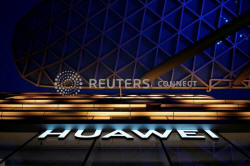U.S. chipmakers quietly lobby to ease Huawei ban
 Send a link to a friend
Send a link to a friend
 [June 17, 2019] By
Stephen Nellis and Alexandra Alper [June 17, 2019] By
Stephen Nellis and Alexandra Alper
SAN FRANCISCO/WASHINGTON (Reuters) -
Huawei's American chip suppliers, including Qualcomm and Intel, are
quietly pressing the U.S. government to ease its ban on sales to the
Chinese tech giant, even as Huawei itself avoids typical government
lobbying, people familiar with the situation said.
Executives from top U.S. chipmakers Intel and Xilinx Inc attended a
meeting in late May with the Commerce Department to discuss a response
to Huawei's placement on the black list, one person said.
The ban bars U.S. suppliers from selling to Huawei, the world's largest
telecommunications equipment company, without special approval, because
of what the government said were national security issues.
Qualcomm has also pressed the Commerce Department over the issue, four
people said.

Chip makers argue that Huawei units selling products such as smartphones
and computer servers use commonly available parts and are unlikely to
present the same security concerns as the Chinese technology firm's 5G
networking gear, according to three people.
"This isn't about helping Huawei. It's about preventing harm to American
companies," one of the people said.
Out of $70 billion that Huawei spent buying components in 2018, some $11
billion went to U.S. firms including Qualcomm, Intel and Micron
Technology Inc.
Qualcomm, for example, wants to be able to continue shipping chips to
Huawei for common devices like phones and smart watches, a person
familiar with the company's situation said.
[to top of second column] |

A Huawei company logo is
seen at a shopping mall in Shanghai, China June 3, 2019. REUTERS/Aly
Song/File Photo

The Semiconductor Industry Association (SIA), a trade group, acknowledged it
arranged consultations with the U.S. government on behalf of the companies to
help them comply and brief officials on the impact of the ban on the companies.
"For technologies that do not relate to national security, it seems they
shouldn't fall within the scope of the order. And we have conveyed this
perspective to government," said Jimmy Goodrich, vice president of global policy
at SIA.
The ban came soon after the breakdown of talks to end the months-long trade spat
between China and the United States, spurred by U.S. allegations of Chinese
corporate espionage, intellectual property theft and forced technology transfer.
Google, which sells hardware, software and technical services to Huawei, has
also advocated so it can keep selling to the company, Huawei Chairman Liang Hua
told reporters in China earlier this month.
The online search company, a unit of Alphabet Inc, said in a statement that it
works with Commerce to ensure it is in compliance with the new rules.
[© 2019 Thomson Reuters. All rights
reserved.] Copyright 2019 Reuters. All rights reserved. This material may not be published,
broadcast, rewritten or redistributed.
Thompson Reuters is solely responsible for this content.
 |